- Home
- Peter S. Beagle
The Folk Of The Air Page 18
The Folk Of The Air Read online
Page 18
Nicholas Bonner never stopped humming. He neither flinched nor turned, but continued to cradle the sleeping Joshua. When he raised his head at last—oh, dear Jesus, what could a little kid ever make of those eyes?—the champagne stare fixed itself on a point beyond Farrell’s right shoulder. Farrell heard a snuffling snicker and knew that Aiffe was there.
She was wearing the blue houppelande that she had worn at the Revels and a sort of gauzy wimple, bulging like a mail sack with her hair. The last time Farrell had seen her close for more than a moment, she had been slumped in Nicholas’ arms, as vulnerable as Joshua and far more helpless. Now she was bouncing on her toes, grinning and shivering urgently, the toneless skin truly radiant with something better than health. “Oh, let me,” she said like a lover. Nicholas made no response, but Farrell felt a freezing permission pass between them, grazing his cheek like a flung stone. Aiffe pointed at Sir Mordred, now placidly grooming himself, and crooned, “Bad kitty, you bad kitty,” in a voice as soft as Nicholas Bonner’s lullaby. Farrell heard them both in his sleep from that night on.
Sir Mordred looked up in blue-eyed complacency from the technical challenge of washing the back of his neck. Apparently dismissing Aiffe as easily as Farrell, he rolled over and started in on his white-butter stomach. Abruptly his jaws snapped in the damp fur, and he uttered a tiny cry of astonishment and hurt. He licked the place rapidly for a moment; then—with a stilted, uncatlike movement, as though his face were being forced into a bowl of milk—he bit his belly again and again, each time yowling more loudly.
The silver expert said sympathetically, “Ah, poor Puss, poor wretch, truly I’ve not seen a year the like of this one for vermin. Anyway, you always buy when it falls below that price.”
Joshua mumbled, “Postern,” burrowing against Nicholas Bonner’s shoulder.
She can’t be making him, they can’t be. Sir Mordred was biting and scratching himself frantically now, his cries muffled by his own flesh. Aiffe came to kneel beside him, stroking him and murmuring so gently that her lips barely moved, and Farrell could not hear her at all. But he knew what she was saying; he could feel the words in fire almost as surely and terribly as Sir Mordred, bad kitty bad kitty bad kitty. The Siamese fell onto his side, writhing in a circle. Aiffe said aloud, “I guess it’s fleas. I don’t know what’s wrong with him.”
Farrell started forward, but Nicholas Bonner looked straight at him for the first time, and it seemed very clear to Farrell that to take another step was to fall off the edge of everything forever, never dying, just falling. Is this the way Ben feels?
Then it was over, quite suddenly, because the Lady Alisoun came in looking for her nephew, and Nicholas put him into her arms. Joshua half woke for a moment, clinging sweatily to Nicholas and complaining that he wanted to finish the castle. Aiffe jumped up lightly and went to join them. She stroked Joshua’s dangling leg, exactly as she had petted Sir Mordred, and retied his loose shoelaces.
Sir Mordred climbed slowly to his feet, shook himself, and sneezed. He appeared undamaged, but there was blood on his mouth and the blue eyes were dazed and mad. When Farrell tried to pick him up, the kitten bit his hand savagely and ran off, wobbling and tucking his tail like a dog. Farrell watched the group around Joshua until they left the room together. Aiffe looked back at him, grinned until her upper lip disappeared, and stuck out her pink tongue.
Outside in the garden, there were crickets and a big, soft, droopy-looking moon and some bird whistling as if it had human lips and teeth, but there was no sign of Julie. Farrell stood still for a while, breathing the jasmine-slow air and nursing his chewed hand. Then he wandered thoughtfully toward the boxwood maze, which had been designed to represent two linked and initialed hearts, in the Tudor style. It had lately been allowed to go untended until its original shape was as blurred as a cloud formation, but the path into its scrolled center was still open, and someone had pushed through the invading overgrowth before him. Farrell followed the track of broken brambles, letting the lute strings sound loudly, so Julie would know who it was.
She was standing with her back to him, looking up at the silhouettes of gargoyles on the turret roofs. When Farrell put his hands on her shoulders, she said, without turning, “I was coming in”; and then, as the sharp, monotonous cry made them both start, “I hate that stupid bird. I always think it’s somebody signaling to somebody else.”
“That’s your California surfing bird,” Farrell said gravely. “Not too usual this far north, but common as dirt, you get down around Santa Cruz. That one’s just trying to talk some other birds into coming night-surfing with it. They hate going out alone, because of the elephant seals.”
Julie turned, stared at him expressionlessly for a moment, then suddenly began tickling his ribs, fiercely enough to make him yelp and duck away. “Damn you, I believed you,” she gasped. “Right up to the damn seals, I believed you, I still fall for it.” Her fingers were digging into him painfully, almost clawing.
Farrell saw her eyes in the moonlight, forgot his care for the lute and simply put his arms around her, holding her as tightly as he could until she quieted against him. “Tell me,” he said. She felt as astonishingly hot as a sleeping child, and he thought, it could have been Joshua, it could just as easily have been Joshua as that cat. “Love,” he said. “Jewel. Please tell me.”
When she looked at him again, her eyes were dry, and her voice was perfectly level, even teasing. She said, “Just sad. All at once, all over, just sad for no reason. The American ailment, it goes away. Now you tell me how you had fun.”
Farrell recounted his evening for her, lingering over any event that seemed to have a chance of making her laugh. Elizabeth Bathory’s pythons were no help, but his mimicry of knights and ladies arguing in the League talk about bilingual ballots was good for a small chuckle; and when he described the Lady Janet of Carterhaugh trying blindly to peel Sir Mordred off her headdress, he could feel Julie’s body easing in his arms and her amusement loosening and warming his own tense muscles. She said in some anxiety, “Your hand’s bleeding, there. What happened?”
Farrell took a careful breath. “The cat,” he said. “Aiffe bewitched it—Aiffe and him.” Like the Lady Janet’s Tam Lin, Julie changed as he held her, first to stone and immediately after to a bar of soap, skidding through his hands and starting out of the maze without looking back. Farrell followed, his bewilderment quickly giving way to anger. “Jewel, you are going to hear this, you hold up a damn minute.”
The path was too narrow for them to walk abreast, and he found himself lurching and half skipping after her, constantly off-balance, his face whipped by dry leaves and twigs every time he grabbed at her shoulder. He caught up with her a bend before the entrance and barred her way. She said, “Let me by, Joe,” but she did not try to push past him.
“This is dumb,” he said loudly. “You know how dumb this is? Other people can’t talk about their sex lives, they can’t talk about money, politics, the kids, each other’s driving. You and I, we only have two things we can’t talk about, and one of them is a fifteen-year-old twit with pimples and magical powers. I never heard of anything so stupid.”
Julie said, “I want to go home.” She took a step forward, but the California surfing bird whistled again, and she jumped in alarm, and then shouted, “Damn bird, you damn bird!” at the top of her lungs. As though her furious breath had reached them, the lights of the wedding feast, seen lilting like birthday candles through the maze’s patchy green walls, suddenly shivered and went out. A figure too tall to be quite human, shaped wrongly to be entirely human, was moving between the castle and the maze in a way that was not human at all. Julie backed silently against Farrell, who was grateful.
They heard the hoofbeats first, scraping deliberately on the courtyard stones, and then the voice. “The desire of increasing riches occupieth you, till ye come to the grave. Nay! but in the end ye shall know. Nay! once more, in the end ye shall know your folly. Nay! would that ye knew it with knowled
ge of certainty. Surely ye shall see hellfire. Then shall ye surely see it with the eye of certainty. Then shall ye on that day be taken to task concerning pleasures.” The cold, piercing drone might have rattled in the cavities of a naked skull, but Farrell had heard it before.
Beside him Julie made a little sound like Sir Mordred when he bit himself for the first time. The black horseman was leaning over the hedge, looking straight down at them. When he smiled, the faint parallel ridges rose on his cheeks, like gill slits. “My kingdom is four months’ journeying long and four months wide,” he said. “In my city, Timbuktu, which is the City of Wisdom, I have as many scribes and scholars as warriors and as many books as I have bars of gold. The throne where I give audience is of ebony, and great elephant tusks arch above my head. Three hundred slaves stand behind my throne. Before me and to my right there stands a giant holding a two-handed sword as big as a man, and to my left my spokesman waits with his mace of office to give my answers and my commands. To the end of my eyesight, the sun blazes off spears and trumpets, armor and jeweled trappings. And I sit in the center of the center of the world and I am not touched. Glorify the Compassionate, the Merciful. I am not touched.” As far as could be seen, he was completely naked.
“And that’s the other one,” Farrell managed to say. “Prester John.” But Julie whispered another name and ran out of the maze, leaving him to trail after her once again. The big horse danced heavily away from her quickness, and the black man on his back seemed to be dancing with him as he brought the animal to an easy halt just out of Julie’s reach. Farrell heard her call the name again—“Micah”—but only the California surfing bird responded.
“Mansa Musa is not touched,” the black man chanted. Farrell saw now that he was wearing a pair of dark trousers, glinting and sliding with the moonlight, and nothing more. “In Cairo the Sultan called me his brother and desired to embrace me, as the men do there, but Allah put him away. I handle neither ivory nor gold nor salt, that they may not handle me. My wives come to me in darkness, that not so much as their shadows in the moon may touch my body. Only Allah touches Mansa Kankan Musa.”
“It’s me,” Julie said hopelessly. “Micah, it’s me.” A tower door opened and closed, sounding very far away, but the courtyard was suddenly crowded with the laughter of people starting home from a party. For a moment, the black man’s immense eyes were upon Farrell, brown as old rivers, deepmuddy with decaying secrets, and streaked by thin, luminous currents and the slow backs of crocodiles. Then he kicked bare heels into his mount’s thick sides, and the horse lumbered through a judicious U-turn and trotted away past the fishpond, under the spiteful faces of the entryway, and on out into the expensively quiet streets beyond. The clopping echoes bounced back and forth between the condominiums long after the man and the horse were out of sight.
Farrell drew Julie back into the maze, for privacy’s sake, and let her cry. He was jealous at first—no one has ever cried for me that way, and no one ever will, I know this—but then Julie raised her face, gasping and hiccuping, and he saw clearly how she would look when she was old. “Baby,” he said, and began helplessly kissing lines and hollows and wounds that were not there yet, sick with tenderness and fear.
Chapter 13
If you’ll look over on your left now, ladies and gentlemen,” Farrell said into the dashboard microphone, “we’re now passing the South American maned wolf.” In his rearview mirror, a dozen faces turned dutifully as directed; two or three others stared straight ahead, meeting his eyes with the wary contempt that certain children always show to magicians. What are you hiding from me while you let me see this? Farrell smiled encouragingly into the mirror, but it only confirmed their suspicions, and he sympathized, having a touch of their complaint himself.
“Despite the name,” he went on, slowing the alligator train as it waddled past the yard where the two shaggy, cinnamon-toast-colored creatures trotted up and down on deer legs, “the maned wolf is actually a large fox—sort of a fox on stilts, as you can see.” He had tried several times to leave the official jokes out of his recitation, but management spies always reported him. “In the wild they live on rodents and insects, but here we feed them chicken and bananas. They’ll eat five pounds of bananas a day, just wolf ‘em right down.” Somebody laughed at that one, and Farrell daydreamed about stopping the train and demanding to know who it was.
The day was windy and warm, and children tumbled like bits of burning paper across the path of the alligator train. The sea lions were coughing croupily away behind the aviary, ringing bells and biting their bicycle horn. A young woman, wearing Army fatigues and a purple cartwheel hat, lifted a small boy out of the way and held him easily in her arms while she waved his hand to the train. Farrell waved back. The implacable faces in the mirror followed his gesture that time, to see if that was it.
“On our right,” he said, “of course, the elephants. This pair of old scroungers, Winston and Daisy, are Indian elephants—born in Sri Lanka, actually—and the big fellow in the next yard is Mr. Ngugi, and he’s from Kenya in East Africa.” Winston and Daisy, who had been circus performers, went into their routine on cue, twining their trunks and rearing, yearning with perfect comic precision toward a world made up entirely of cooing, snack-flinging suckers. But Mr. Ngugi had ragged ears and a broken tusk, and Farrell cringed before the darkly brilliant squint six times a day as he slid by in his green and baby-blue train, repeating in the same words the joke about elephants’ memories. He made the joke this time, too; but an unaccountable impulse led him to go on, not into his usual thirty-three-second closing speech as the alligator train neared its terminus, but straight into the first lines of his favorite D. H. Lawrence poem:
“The elephant, the huge old beast,
is slow to mate;
he finds a female, they show no haste,
they wait
for the sympathy in their vast, shy hearts
slowly, slowly to rouse…“
He said the lines loudly enough for Mr. Ngugi to hear, and never noticed the sad-faced bald man who flushed and began very vigorously to button up his daughter’s jacket, nor the old woman who yanked her two small grandchildren to their feet, towed them to the door, and practically slung them off the train, which was still moving. He halted it between the proper yellow lines, trying to recall the part about the great beasts mating in secret, hiding their fire. None of his passengers looked at him as they scrambled down. Farrell sang the last verse softly into the microphone.
“They do not snatch, they do not tear;
their massive blood
moves as the moon-tides, near, more near,
till they touch in flood.“
Pleased with himself, he leaned on his elbow in the round window that was the alligator’s left eye and waved to the young Chicano peanut vendor across the path. The peanut vendor grinned at him, shaking his head and drawing a forefinger cheerfully across his throat. “Abandon ship, chulo,” he called. “Better tell me now where you want your stuff shipped on to.”
“Jaime,” Farrell said, “you really must try to remember about not being in Yuba City anymore. There wasn’t so much as a phooey in that poem—it was educational and scientific in nature, and all those people got college credit just for listening to it. So did you, of course. Trade the experience in at any night school in the country.”
But the peanut vendor shook his head again. “I didn’t hear three words of it, didn’t even know it was a poem. All I know is you weren’t saying those good lines they wrote down for you to say. I hear you doing that thing every day, over and over, you think I can’t tell when the beat changes?” Abruptly he scaled a bag of peanuts sidearm through the window into Farrell’s lap. “You were doing it different,” Jaime said, “you think they couldn’t tell? Making stuff up on them, more than likely. They hate that, man. They paid for exactly the same show everyone else gets. So not only are you some kind of elephant pervert, you did them out of money. Oh, there will be cards and letters. T
here will be damn singing telegrams about you, man.”
“Next round, The Bastard King of England,” Farrell said. He stood up, stuffing the peanuts into a pocket of his forestgreen jumpsuit, which had been tailored for a larger man and hung on him like a parachute snagged on tree branches. He turned to check the seats for knife slashes, forgotten dolls, bombs, and fallen change. From the last seat in the rear row, with the Petting Zoo reflected in the window behind her, the dog Briseis looked at him.
After a long time, and from a long distance, Farrell heard himself say, “Get down, Briseis. They don’t let dogs on the zoo train.” The rear door’s open, she must have gotten on that way. I just didn’t see her. He started toward her, but Briseis growled once, so quietly that Farrell froze between steps, suddenly very uncertain of his ability to identify dogs. She stared boldly into his eyes, as he had never known her to do, then leaped to the floor and out of the train in two elegant bounds that were nothing like the movements of Sia’s clumping, apologetic old companion. Turning to look back at Farrell, she growled again, and this time it was unquestionably a command. Farrell was never mistaken about commands.
“Wal, Ah swan, Ah reckon the critter wants me to follow her,” he said aloud, just to keep the whole affair on the level of a Lassie movie as long as possible. Briseis was loping away, back past the elephants, then slanting off in the direction of the employees’ rest-room. She neither slowed for Farrell, nor looked around to be sure of him. He trailed after her, trying to keep her in sight without really running, feeling like the White Rabbit as he checked his watch to see that he had almost an hour of liberty before the alligator train’s next appointed round. His supervisor, who mistrusted him, called questioningly as he hurried by. Farrell waved, earnestly yelled back, “Till they touch in flood,” and kept moving. I’m late, I’m late, for a very important date, and I am not dressed for it, whatever it is.

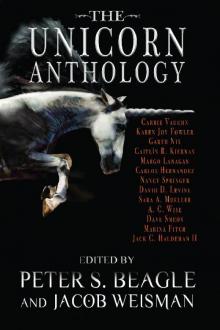 The Unicorn Anthology.indb
The Unicorn Anthology.indb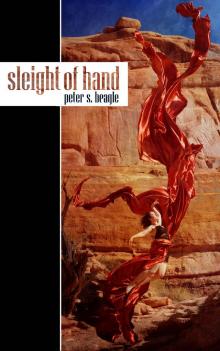 Sleight of Hand
Sleight of Hand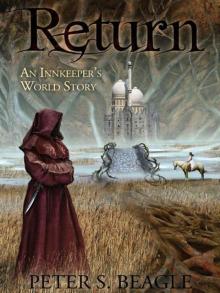 Return
Return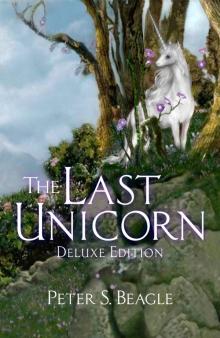 The Last Unicorn
The Last Unicorn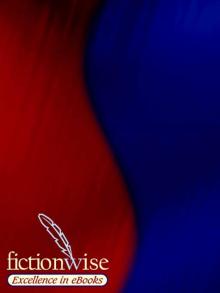 Two Hearts
Two Hearts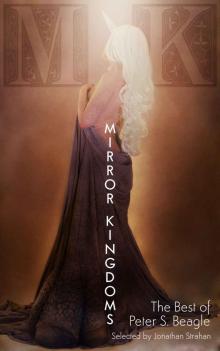 Mirror Kingdoms: The Best of Peter S. Beagle
Mirror Kingdoms: The Best of Peter S. Beagle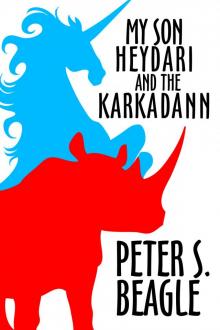 My Son Heydari and the Karkadann
My Son Heydari and the Karkadann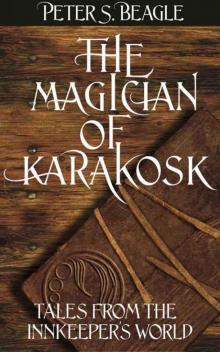 The Magician of Karakosk, and Other Stories
The Magician of Karakosk, and Other Stories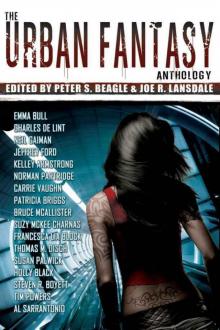 The Urban Fantasy Anthology
The Urban Fantasy Anthology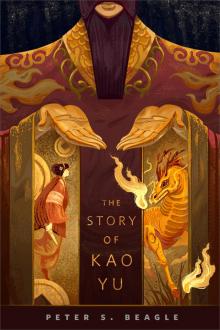 The Story of Kao Yu
The Story of Kao Yu The Karkadann Triangle
The Karkadann Triangle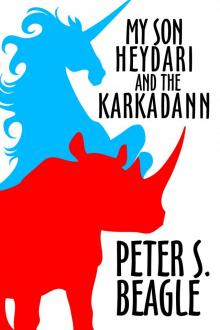 My Son and the Karkadann
My Son and the Karkadann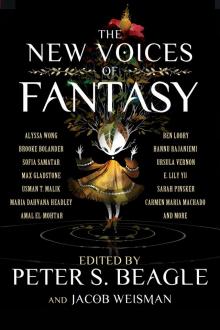 The New Voices of Fantasy
The New Voices of Fantasy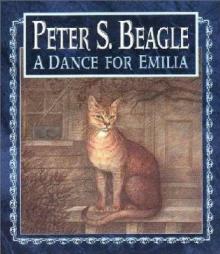 A Dance for Emilia
A Dance for Emilia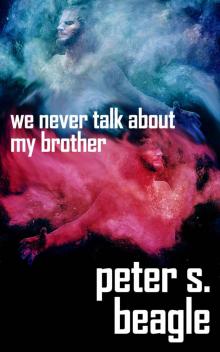 We Never Talk About My Brother
We Never Talk About My Brother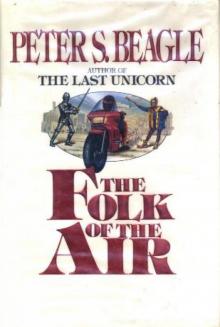 The Folk Of The Air
The Folk Of The Air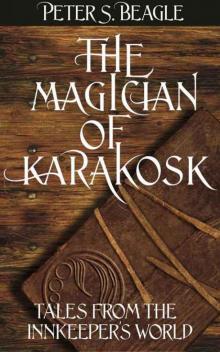 The Magician of Karakosk: Tales from the Innkeeper's World
The Magician of Karakosk: Tales from the Innkeeper's World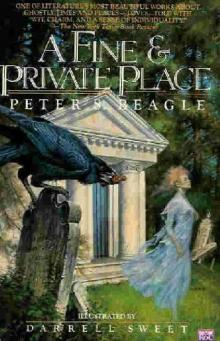 A Fine and Private Place
A Fine and Private Place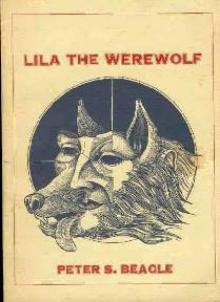 Lila The Werewolf
Lila The Werewolf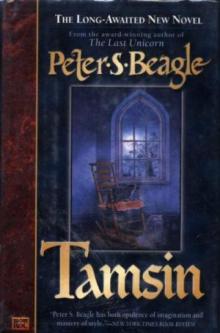 Tamsin
Tamsin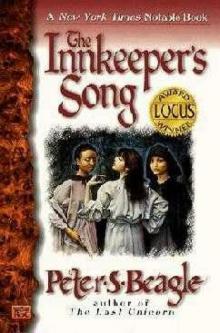 Innkeeper's Song
Innkeeper's Song